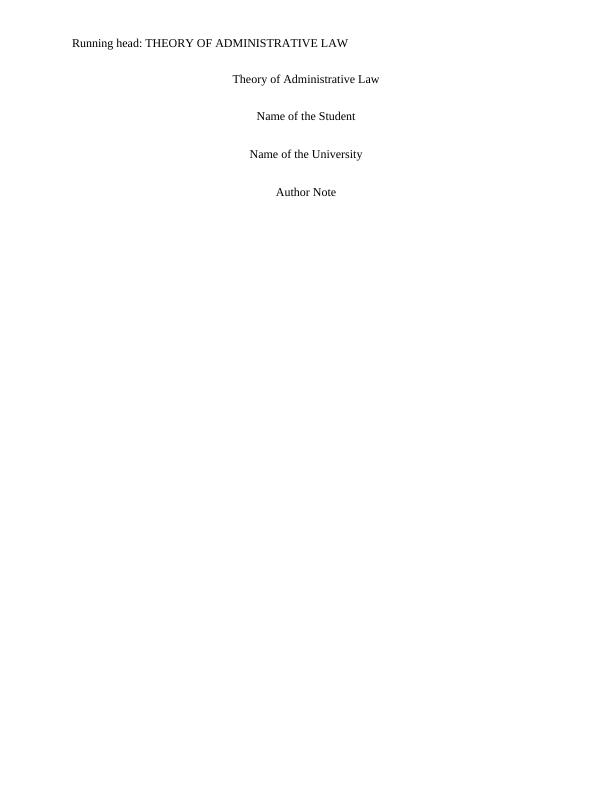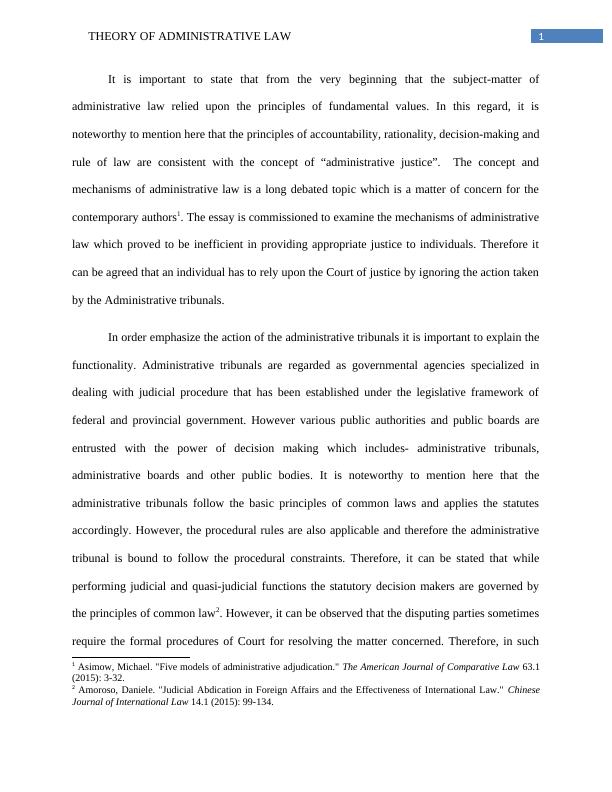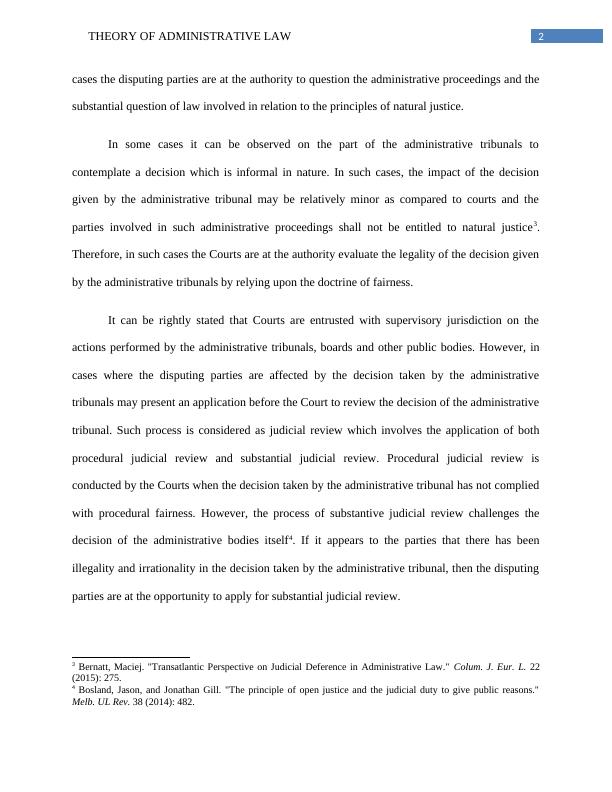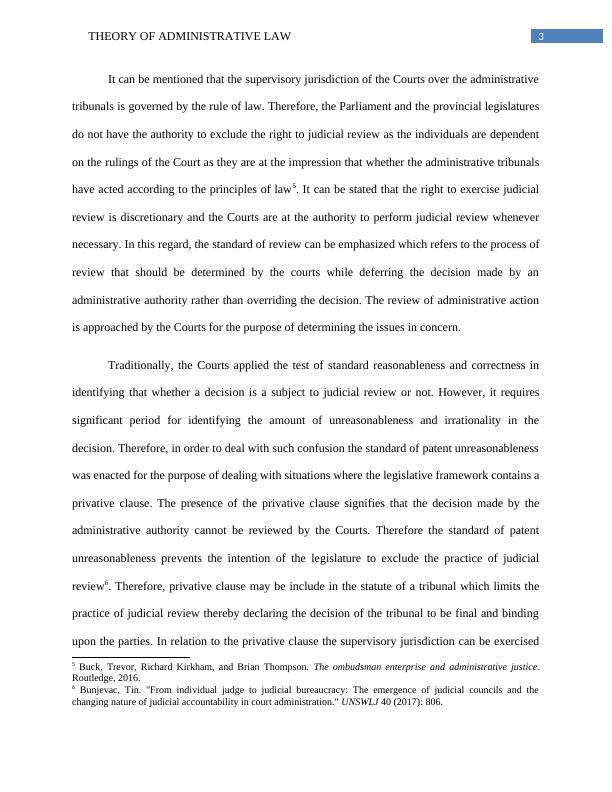Theory of Administrative Law
Added on 2023-06-15
19 Pages6247 Words342 Views
Running head: THEORY OF ADMINISTRATIVE LAW
Theory of Administrative Law
Name of the Student
Name of the University
Author Note
Theory of Administrative Law
Name of the Student
Name of the University
Author Note

1THEORY OF ADMINISTRATIVE LAW
It is important to state that from the very beginning that the subject-matter of
administrative law relied upon the principles of fundamental values. In this regard, it is
noteworthy to mention here that the principles of accountability, rationality, decision-making and
rule of law are consistent with the concept of “administrative justice”. The concept and
mechanisms of administrative law is a long debated topic which is a matter of concern for the
contemporary authors1. The essay is commissioned to examine the mechanisms of administrative
law which proved to be inefficient in providing appropriate justice to individuals. Therefore it
can be agreed that an individual has to rely upon the Court of justice by ignoring the action taken
by the Administrative tribunals.
In order emphasize the action of the administrative tribunals it is important to explain the
functionality. Administrative tribunals are regarded as governmental agencies specialized in
dealing with judicial procedure that has been established under the legislative framework of
federal and provincial government. However various public authorities and public boards are
entrusted with the power of decision making which includes- administrative tribunals,
administrative boards and other public bodies. It is noteworthy to mention here that the
administrative tribunals follow the basic principles of common laws and applies the statutes
accordingly. However, the procedural rules are also applicable and therefore the administrative
tribunal is bound to follow the procedural constraints. Therefore, it can be stated that while
performing judicial and quasi-judicial functions the statutory decision makers are governed by
the principles of common law2. However, it can be observed that the disputing parties sometimes
require the formal procedures of Court for resolving the matter concerned. Therefore, in such
1 Asimow, Michael. "Five models of administrative adjudication." The American Journal of Comparative Law 63.1
(2015): 3-32.
2 Amoroso, Daniele. "Judicial Abdication in Foreign Affairs and the Effectiveness of International Law." Chinese
Journal of International Law 14.1 (2015): 99-134.
It is important to state that from the very beginning that the subject-matter of
administrative law relied upon the principles of fundamental values. In this regard, it is
noteworthy to mention here that the principles of accountability, rationality, decision-making and
rule of law are consistent with the concept of “administrative justice”. The concept and
mechanisms of administrative law is a long debated topic which is a matter of concern for the
contemporary authors1. The essay is commissioned to examine the mechanisms of administrative
law which proved to be inefficient in providing appropriate justice to individuals. Therefore it
can be agreed that an individual has to rely upon the Court of justice by ignoring the action taken
by the Administrative tribunals.
In order emphasize the action of the administrative tribunals it is important to explain the
functionality. Administrative tribunals are regarded as governmental agencies specialized in
dealing with judicial procedure that has been established under the legislative framework of
federal and provincial government. However various public authorities and public boards are
entrusted with the power of decision making which includes- administrative tribunals,
administrative boards and other public bodies. It is noteworthy to mention here that the
administrative tribunals follow the basic principles of common laws and applies the statutes
accordingly. However, the procedural rules are also applicable and therefore the administrative
tribunal is bound to follow the procedural constraints. Therefore, it can be stated that while
performing judicial and quasi-judicial functions the statutory decision makers are governed by
the principles of common law2. However, it can be observed that the disputing parties sometimes
require the formal procedures of Court for resolving the matter concerned. Therefore, in such
1 Asimow, Michael. "Five models of administrative adjudication." The American Journal of Comparative Law 63.1
(2015): 3-32.
2 Amoroso, Daniele. "Judicial Abdication in Foreign Affairs and the Effectiveness of International Law." Chinese
Journal of International Law 14.1 (2015): 99-134.

2THEORY OF ADMINISTRATIVE LAW
cases the disputing parties are at the authority to question the administrative proceedings and the
substantial question of law involved in relation to the principles of natural justice.
In some cases it can be observed on the part of the administrative tribunals to
contemplate a decision which is informal in nature. In such cases, the impact of the decision
given by the administrative tribunal may be relatively minor as compared to courts and the
parties involved in such administrative proceedings shall not be entitled to natural justice3.
Therefore, in such cases the Courts are at the authority evaluate the legality of the decision given
by the administrative tribunals by relying upon the doctrine of fairness.
It can be rightly stated that Courts are entrusted with supervisory jurisdiction on the
actions performed by the administrative tribunals, boards and other public bodies. However, in
cases where the disputing parties are affected by the decision taken by the administrative
tribunals may present an application before the Court to review the decision of the administrative
tribunal. Such process is considered as judicial review which involves the application of both
procedural judicial review and substantial judicial review. Procedural judicial review is
conducted by the Courts when the decision taken by the administrative tribunal has not complied
with procedural fairness. However, the process of substantive judicial review challenges the
decision of the administrative bodies itself4. If it appears to the parties that there has been
illegality and irrationality in the decision taken by the administrative tribunal, then the disputing
parties are at the opportunity to apply for substantial judicial review.
3 Bernatt, Maciej. "Transatlantic Perspective on Judicial Deference in Administrative Law." Colum. J. Eur. L. 22
(2015): 275.
4 Bosland, Jason, and Jonathan Gill. "The principle of open justice and the judicial duty to give public reasons."
Melb. UL Rev. 38 (2014): 482.
cases the disputing parties are at the authority to question the administrative proceedings and the
substantial question of law involved in relation to the principles of natural justice.
In some cases it can be observed on the part of the administrative tribunals to
contemplate a decision which is informal in nature. In such cases, the impact of the decision
given by the administrative tribunal may be relatively minor as compared to courts and the
parties involved in such administrative proceedings shall not be entitled to natural justice3.
Therefore, in such cases the Courts are at the authority evaluate the legality of the decision given
by the administrative tribunals by relying upon the doctrine of fairness.
It can be rightly stated that Courts are entrusted with supervisory jurisdiction on the
actions performed by the administrative tribunals, boards and other public bodies. However, in
cases where the disputing parties are affected by the decision taken by the administrative
tribunals may present an application before the Court to review the decision of the administrative
tribunal. Such process is considered as judicial review which involves the application of both
procedural judicial review and substantial judicial review. Procedural judicial review is
conducted by the Courts when the decision taken by the administrative tribunal has not complied
with procedural fairness. However, the process of substantive judicial review challenges the
decision of the administrative bodies itself4. If it appears to the parties that there has been
illegality and irrationality in the decision taken by the administrative tribunal, then the disputing
parties are at the opportunity to apply for substantial judicial review.
3 Bernatt, Maciej. "Transatlantic Perspective on Judicial Deference in Administrative Law." Colum. J. Eur. L. 22
(2015): 275.
4 Bosland, Jason, and Jonathan Gill. "The principle of open justice and the judicial duty to give public reasons."
Melb. UL Rev. 38 (2014): 482.

3THEORY OF ADMINISTRATIVE LAW
It can be mentioned that the supervisory jurisdiction of the Courts over the administrative
tribunals is governed by the rule of law. Therefore, the Parliament and the provincial legislatures
do not have the authority to exclude the right to judicial review as the individuals are dependent
on the rulings of the Court as they are at the impression that whether the administrative tribunals
have acted according to the principles of law5. It can be stated that the right to exercise judicial
review is discretionary and the Courts are at the authority to perform judicial review whenever
necessary. In this regard, the standard of review can be emphasized which refers to the process of
review that should be determined by the courts while deferring the decision made by an
administrative authority rather than overriding the decision. The review of administrative action
is approached by the Courts for the purpose of determining the issues in concern.
Traditionally, the Courts applied the test of standard reasonableness and correctness in
identifying that whether a decision is a subject to judicial review or not. However, it requires
significant period for identifying the amount of unreasonableness and irrationality in the
decision. Therefore, in order to deal with such confusion the standard of patent unreasonableness
was enacted for the purpose of dealing with situations where the legislative framework contains a
privative clause. The presence of the privative clause signifies that the decision made by the
administrative authority cannot be reviewed by the Courts. Therefore the standard of patent
unreasonableness prevents the intention of the legislature to exclude the practice of judicial
review6. Therefore, privative clause may be include in the statute of a tribunal which limits the
practice of judicial review thereby declaring the decision of the tribunal to be final and binding
upon the parties. In relation to the privative clause the supervisory jurisdiction can be exercised
5 Buck, Trevor, Richard Kirkham, and Brian Thompson. The ombudsman enterprise and administrative justice.
Routledge, 2016.
6 Bunjevac, Tin. "From individual judge to judicial bureaucracy: The emergence of judicial councils and the
changing nature of judicial accountability in court administration." UNSWLJ 40 (2017): 806.
It can be mentioned that the supervisory jurisdiction of the Courts over the administrative
tribunals is governed by the rule of law. Therefore, the Parliament and the provincial legislatures
do not have the authority to exclude the right to judicial review as the individuals are dependent
on the rulings of the Court as they are at the impression that whether the administrative tribunals
have acted according to the principles of law5. It can be stated that the right to exercise judicial
review is discretionary and the Courts are at the authority to perform judicial review whenever
necessary. In this regard, the standard of review can be emphasized which refers to the process of
review that should be determined by the courts while deferring the decision made by an
administrative authority rather than overriding the decision. The review of administrative action
is approached by the Courts for the purpose of determining the issues in concern.
Traditionally, the Courts applied the test of standard reasonableness and correctness in
identifying that whether a decision is a subject to judicial review or not. However, it requires
significant period for identifying the amount of unreasonableness and irrationality in the
decision. Therefore, in order to deal with such confusion the standard of patent unreasonableness
was enacted for the purpose of dealing with situations where the legislative framework contains a
privative clause. The presence of the privative clause signifies that the decision made by the
administrative authority cannot be reviewed by the Courts. Therefore the standard of patent
unreasonableness prevents the intention of the legislature to exclude the practice of judicial
review6. Therefore, privative clause may be include in the statute of a tribunal which limits the
practice of judicial review thereby declaring the decision of the tribunal to be final and binding
upon the parties. In relation to the privative clause the supervisory jurisdiction can be exercised
5 Buck, Trevor, Richard Kirkham, and Brian Thompson. The ombudsman enterprise and administrative justice.
Routledge, 2016.
6 Bunjevac, Tin. "From individual judge to judicial bureaucracy: The emergence of judicial councils and the
changing nature of judicial accountability in court administration." UNSWLJ 40 (2017): 806.

End of preview
Want to access all the pages? Upload your documents or become a member.
Related Documents
English Legal System Law | Reportlg...
|5
|1088
|61
Question & Answers on Civil Lawslg...
|7
|1712
|19
Role of Judicial Review in UK Constitution - Deskliblg...
|11
|3154
|321
Administrative Appeals Tribunal (AAT)lg...
|3
|671
|124
Administrative Law Assignmentlg...
|13
|2917
|116
Business Law Assignmentlg...
|6
|1134
|416
